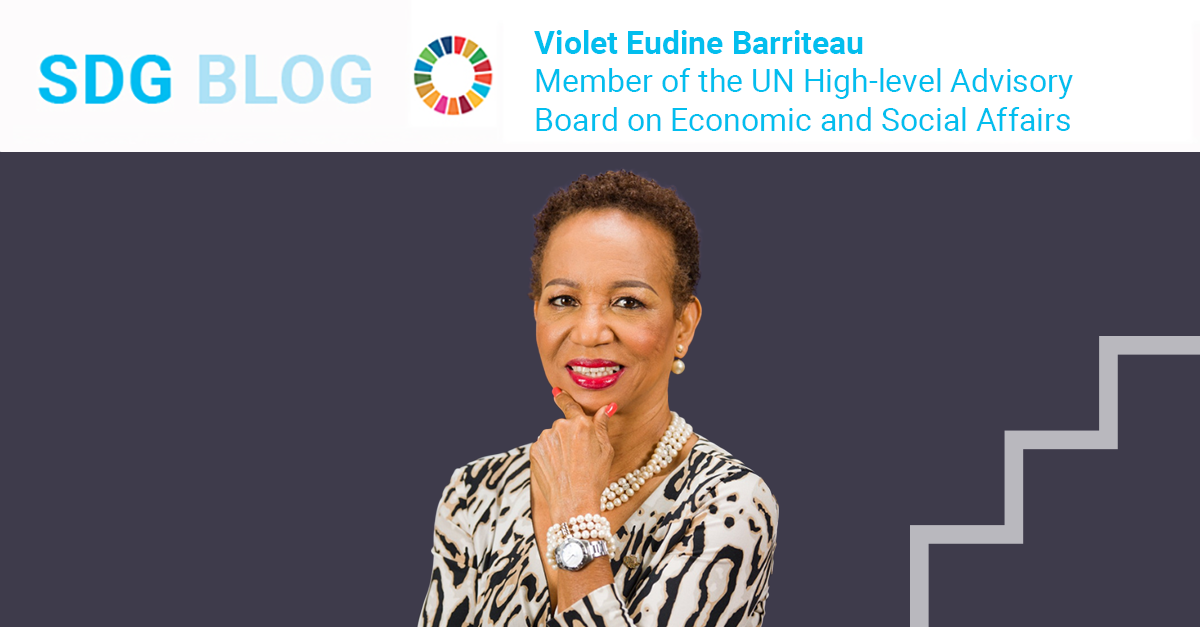SDG Blog

Culture shift on gender equality required to achieve sustainable development
By Violet Eudine Barriteau, former Principal and Pro Vice-Chancellor Professor Emerita of the University of West Indies Cave Hill Campus, Member of the UN High-level Advisory Board on Economic and Social Affairs (HLAB) and the Committee on the Elimination of Discrimination against Women (CEDAW).
Countries worldwide confront intersecting, often contradictory conditions in overcoming gender inequalities and achieving sustainable development. No country argues women and girls are irrelevant to its social, cultural, political and economic well-being. However, they differ on what qualifies as acceptable circumstances for half of humanity, resulting in girls and women continuing to suffer wide-ranging discriminations.
While all countries are dedicated to developing sustainably, some remain reluctant to alter policies and practices that harm girls and women. These countries do not sufficiently examine how promoting gender equality advances achieving the very Sustainable Development Goals they desire. Instead, they maintain that removing punitive legislation and prohibiting harmful practices, while introducing remedial laws and corrective policies, would violate their culture. Culture is not an impenetrable, immovable wall. Instead, culture offers a valuable, vibrant and dynamic gateway for States, the UN, and civil society organizations, working collaboratively to organize dialogues on how best to tackle gender inequalities.
Gender inequalities include: unequal pay for work of the same value; limited or no employment opportunities; poor provision of health care; no role in communal, regional or national decision-making; limited educational opportunities; no opportunity to participate in recreational or professional sport; no safe public spaces for leisure, sexual harassment, gender-based violence; and women and girls undertaking an unequal share of domestic and care work. Dialogues should emphasize that women and girls experience disproportionately the impact of conflicts, climate change and new technologies. The dialogues should generate equal opportunities for women and girls to access education, healthcare, housing, transportation, employment and the fair distribution of income as affirmed by Article 8 of the Declaration on the Right to Development.
Working with the respective cultures, these dialogues must be inclusive, respectful and consultative. They should generate greater awareness of gender equality and its benefits to families, communities and countries when women and girls are treated as integral, valued members of societies. Countries should lead on creating culturally sensitive approaches that devise multiple outreach strategies through listening to the concerns of women and girls. The involvement of women’s organizations, UN agencies, universities, trade unions, and employers’ associations are all critical to explaining the linkages between development policies, programmes and projects, and gender equality.
These consultations should demonstrate that when women participate in decision-making, countries and communities enjoy stronger social cohesion and expanded economic activity. When women participate economically, GDP increases, quality of life improves, and States enjoy greater economic, political and social stability. When women and girls experience gender-based violence and gender discrimination (GBV&D), it robs societies of stability and cohesion. When violence, negative views about their relevance, or workplace discrimination, prevent women from participating equally in the workforce, macroeconomic activity is reduced. In many cases, GBV&D mushrooms into economic violence.
When States do not confront GBV&D, through legislation, policies, programmes, and supportive structures, women are not only harmed, but are often unable to work, earn a living or undertake household work. This is economic violence. This also works against achieving sustainable development. Besides experiencing unfair employment practices such as being bypassed for training, promotion, equal pay, and forced to endure a range of sexual harassment and other forms of discrimination, States can unwittingly perpetuate an additional layer of gender discrimination by not addressing the complaints of women and girls. When States do not provide legislative protection, when there is an absence of policies, monitoring mechanisms, and supportive structures to provide redress and shelter, States compound existing gender inequalities.
Development partners must work together to correct the misconception that pursuing policies that benefit women’s economic activity is a form of undeserved charity, working against men and families. Improving women’s economic participation delivers benefits to women, their families and their countries. Investing in enhancing women’s economic engagement, promoting and protecting their economic participation is required for sustainable development.
Women and girls have a right to participate as full and equal members of their societies. Viewing women as a marginalized group in need of State welfare transfers, ignores the facts that when women earn more income, or are more productive in economic sectors, economic and social activities within countries increase. Women build or repair houses, maintain homes, buy cars or other means of transport, invest in or start businesses, plant food crops and raise livestock. They support households, educate children, run their businesses and assist their spouses emotionally and financially. These activities contribute social, cultural and economic value.
In deploying culture as a gateway to introducing improvements in the lives of women and girls, States should emphasize the widespread social and economic benefits of recognising women as equal citizens and advancing achieving the Sustainable Development Goals.
* Violet Eudine Barriteau is the former Principal and Pro Vice-Chancellor Professor Emerita of the University of West Indies Cave Hill Campus. She is a member of the UN High-level Advisory Board on Economic and Social Affairs (HLAB) and the Committee on the Elimination of Discrimination against Women (CEDAW).
* The views expressed in this blog are the author’s and do not necessarily reflect the opinion of UN DESA.
 Welcome to the United Nations
Welcome to the United Nations